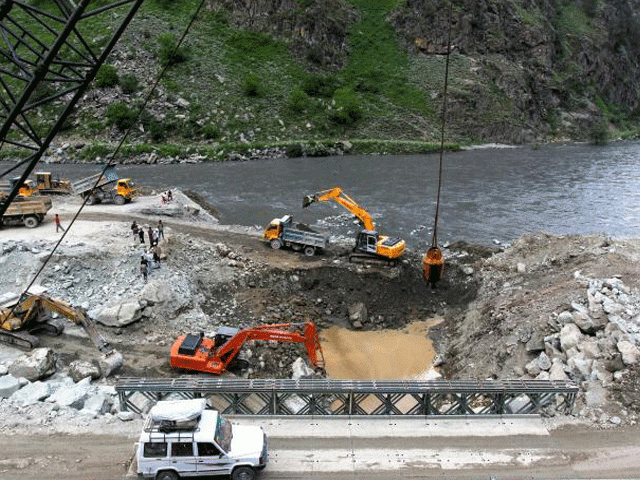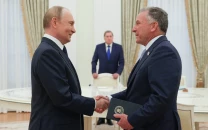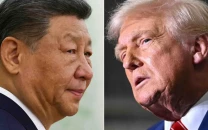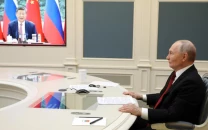India fast-tracks hydro projects in occupied Kashmir
Pakistan believes the projects violate the Indus Waters Treaty on the sharing of the Indus River and its tributaries

A private vehicle crosses a bridge as excavators are used at the dam site of Kishanganga power project in Gurez, 160 km (99 miles) north of Srinagar June 21, 2012. PHOTO: REUTERS
The swift approval of projects that had languished for years came after Indian Prime Minister Narendra Modi suggested last year that sharing the waterways could be conditional on Pakistan clamping down on anti-India militants that New Delhi says it shelters.
India's water will not be allowed to go to Pakistan: Modi
Pakistan has opposed some of these projects before, saying they violate a World Bank-mediated treaty (Indus Waters Treaty) on the sharing of the Indus River and its tributaries upon which 80% of its irrigated agriculture depends.
The schemes, the largest of which is the 1,856 MW Sawalkote plant, will take years to complete, but their approval could prove a flashpoint between the nuclear-armed neighbours at a time when relations are at low ebb.
"I say the way you look at these projects, it is not purely a hydro project. Broaden it to a strategic water management, border management problem, and then you put in money," said Pradeep Kumar Pujari, a top ranking official in the power ministry.
Pakistan denies any involvement in the 28-year insurgency in Indian-held Kashmir and has repeatedly urged New Delhi to hold talks to decide the future of the region.
Pakistan's Foreign Ministry spokesperson Nafees Zakaria said he would confer with the Ministry of Water and Power on the proposed Indian projects, saying it was a technical matter.
He noted, however, that India would be attending a regular meeting of the Indus Commission later this month in Lahore, even though the broader peace dialogue was on hold.
"It seems that finally India has realised the importance of this mechanism under the IWT (Indus Waters Treaty) for resolving water disputes related to the Indus water and its tributaries."
Triple power
Six hydro projects in Indian-held Kashmir either cleared viability tests or the more advanced environment and forest expert approvals in the last three months, two officials in India's Water Resources Ministry and the Central Electricity Authority said separately.
Pakistan warns India against breach of water treaty
Together these projects on the Chenab River, a tributary of the Indus, would triple hydropower generation in Kashmir from the current level of 3,000 MW, the biggest jump in decades, added the officials, declining to be named because the approvals had not yet been made public.
"We have developed barely one-sixth of the hydropower capacity potential in the state in the last 50 years," the senior official at the Water Resources Ministry said.
"Then one fine morning, you see we cleared six to seven projects in three months; it definitely raises concern in Pakistan."
Pakistan's water supply is dwindling because of climate change, outdated farming techniques and an exploding population.
A 2011 report by the US Senate Committee on Foreign Relations said New Delhi could use these projects as a way to control Pakistan's supplies from the Indus, seen as its jugular vein. "The cumulative effect of these projects could give India the ability to store enough water to limit the supply to Pakistan at crucial moments in the growing season," it said.
India says the projects are "run-of-the-river" schemes that use the river's flow and elevation to generate electricity rather than large reservoirs, and do not contravene the treaty.
Environmental groups have questioned whether the government has followed proper procedures in fast-tracking projects located in a highly seismic area.
"Blood and water"
Modi told a meeting of government officials on the Indus treaty in 2016 that "blood and water cannot flow together", soon after India blamed Pakistan-based militants for a deadly attack on its troops in Indian-held Kashmir.
World Bank declares pause to protect Indus Waters Treaty
Modi's message was two-fold, Indian foreign ministry spokesperson Gopal Baglay said. Terrorism had to stop and India must fully utilise the economic potential available to it within the Indus treaty.
The projects that have won technical approvals in recent months are Sawalkote, Kwar, Pakal Dul, Bursar and Kirthai I and II.
Most of the projects have been held up for at least a decade awaiting multiple clearances. Sawalkote, which was cleared by a government-constituted environment committee in January, was first given techno-economic approval in 1991.
It is now up for forest clearance from the state authorities, after which the government will finalise financing and begin construction.
Some projects like Pakal Dul were stuck in litigation, but that has been resolved, Power Minister of the held valley said. "Things are now in a position of take-off," he added.
In January, senior Indian officials made a presentation on energy security to Modi in which they proposed interest subsidies and long-term loans for hydroprojects above 100 MW, according to an official document.
But Himanshu Thakkar, coordinator of South Asia Network on Dams, Rivers and People, said some projects had been cleared without impact assessment studies and public consultation.
"It's on one river, the Chenab, where you are doing so many projects. This is a very vulnerable region. It's landslide-prone, it's flash flood-prone, earthquake-prone."



















COMMENTS
Comments are moderated and generally will be posted if they are on-topic and not abusive.
For more information, please see our Comments FAQ